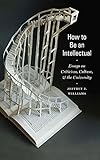How to Be an Intellectual : Essays on Criticism, Culture, and the University / Jeffrey J. Williams.
Material type: TextPublisher: New York, NY : Fordham University Press, [2014]Copyright date: ©2014Description: 1 online resource (232 p.)Content type:
TextPublisher: New York, NY : Fordham University Press, [2014]Copyright date: ©2014Description: 1 online resource (232 p.)Content type: - 9780823263813
- 9780823263837
- Criticism -- United States
- Intellectuals -- United States
- Literature -- Study and teaching (Higher) -- United States
- Education
- Literary Studies
- Philosophy & Theory
- LITERARY CRITICISM / Semiotics & Theory
- American Higher Education
- Cultural Politics
- Intellectuals
- Literary Theory
- Public Criticism
- Student Debt
- University Studies
- 801/.950973 23
- PN99.U5 W55 2015
- online - DeGruyter
| Item type | Current library | Call number | URL | Status | Notes | Barcode | |
|---|---|---|---|---|---|---|---|
 eBook
eBook
|
Biblioteca "Angelicum" Pont. Univ. S.Tommaso d'Aquino Nuvola online | online - DeGruyter (Browse shelf(Opens below)) | Online access | Not for loan (Accesso limitato) | Accesso per gli utenti autorizzati / Access for authorized users | (dgr)9780823263837 |
Browsing Biblioteca "Angelicum" Pont. Univ. S.Tommaso d'Aquino shelves, Shelving location: Nuvola online Close shelf browser (Hides shelf browser)

|

|

|

|

|

|

|
||
| online - DeGruyter Imperial Babel : Translation, Exoticism, and the Long Nineteenth Century / | online - DeGruyter Dancing Jacobins : A Venezuelan Genealogy of Latin American Populism / | online - DeGruyter Cultural Techniques : Grids, Filters, Doors, and Other Articulations of the Real / | online - DeGruyter How to Be an Intellectual : Essays on Criticism, Culture, and the University / | online - DeGruyter Dante and Islam / | online - DeGruyter The Interval : Relation and Becoming in Irigaray, Aristotle, and Bergson / | online - DeGruyter The Lincoln Assassination : Crime and Punishment Myth and MemoryA Lincoln Forum Book / |
Frontmatter -- Contents -- Acknowledgments -- Introduction Introduction -- PART ONE: THE POLITICS OF CRITICISM -- 1. How to Be an Intellectual: Rorty v. Ross -- 2. The Retrospective Tenor of Recent Theory -- 3. The Rise of the Theory Journal -- 4. How Critics Became Smart -- 5. Publicist Intellectuals -- 6. The Ubiquity of Culture -- 7. Credibility and Criticism: On Walter Benn Michaels -- 8. The Statistical Turn in Literary Criticism -- PART TWO: PROFILES IN CRITICISM -- 9. Prodigal Critics: Bloom, Fish, and Greenblatt -- 10. A Life in Criticism: M. H. Abrams -- 11. Bellwether: J. Hillis Miller -- 12. The Political Theory License: Michael Walzer -- 13. The Critic as Wanderer: Terry Eagleton -- 14. From Cyborgs to Animals: Donna Haraway -- 15. Intellectuals and Politics: Stefan Collini -- 16. The Editor as Broker: Gordon Hutner -- 17. Gaga Feminism: Judith “Jack” Halberstam -- 18. Book Angst -- PART THREE: THE PREDICAMENT OF THE UNIVERSITY -- 19. The Pedagogy of Debt -- 20. Student Debt and the Spirit of Indenture -- 21. The Academic Devolution -- 22. The Neoliberal Bias of Higher Education -- 23. The University on Film -- 24. The Thrill Is Gone -- 25. Unlucky Jim -- 26. Academic Opportunities Unlimited -- PART FOUR: THE PERSONAL AND THE CRITICAL -- 27. The Pedagogy of Prison -- 28. Shelf Life -- 29. Teacher: Remembering Michael Sprinker -- 30. My Life as Editor -- 31. Other People’s Words -- 32. Long Island Intellectual
restricted access online access with authorization star
http://purl.org/coar/access_right/c_16ec
Over the past decade, Jeffrey J. Williams has been one of the most perceptive observers of contemporary literary and cultural studies. He has also been a shrewd analyst of the state of American higher education. How to Be an Intellectual brings together noted and new essays and exemplifies Williams’s effort to bring criticism to a wider publicHow to Be an Intellectual profiles a number of critics, drawing on a unique series of interviews that give an inside look at their work and careers. The book often looks at critical thought from surprising angles, examining, for instance, the history of modern American criticism in terms of its keywords as they morphed from sound to rigorous to smart. It also puts in plain language the political travesty of higher education policies that produce student debt, which, as Williams demonstrates, all too readily follow the model of colonial indenture, not just as a metaphor but in actual point of fact.How to Be an Intellectual tells a story of intellectual life since the culture wars. Shedding academic obscurity and calling for a better critical writing, it reflects on what makes the critic and intellectual—the accidents of careers, the trends in thought, the institutions that shape us, and politics. It also includes personal views of living and working with books.
Mode of access: Internet via World Wide Web.
In English.
Description based on online resource; title from PDF title page (publisher's Web site, viewed 03. Jan 2023)


